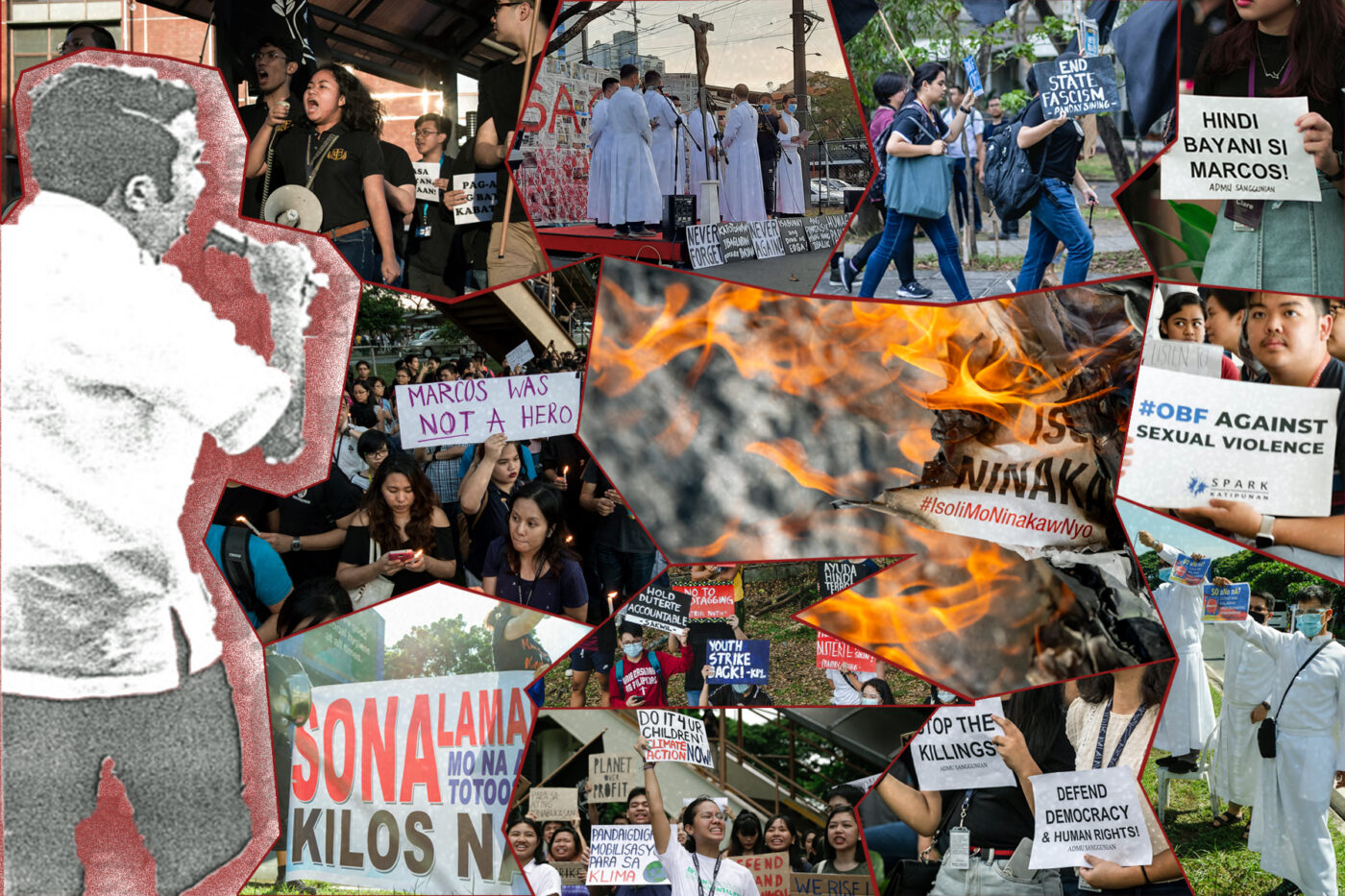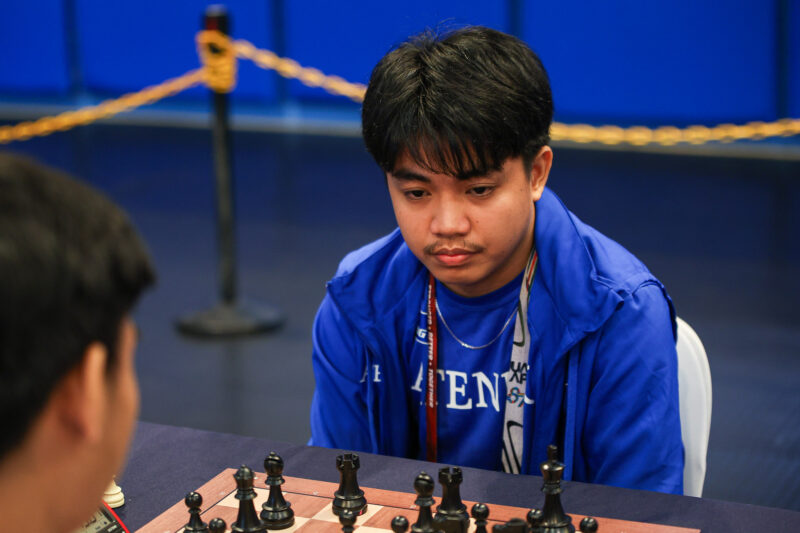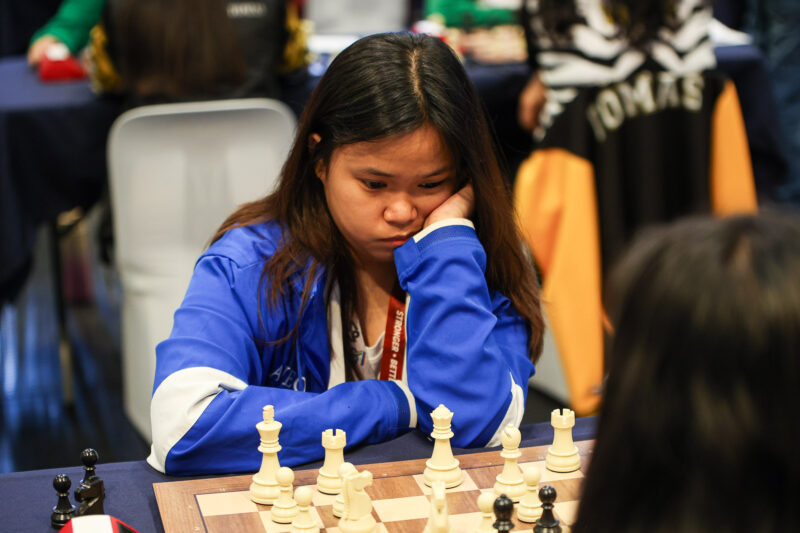SITUATING ITSELF in the larger Philippine society, the Ateneo has been a cradle of student activists who stood at the forefront of the national struggle for liberation and social justice.
From burning newsprints of publications owned by Marcos cronies in 1983 to denouncing the Anti-Terror Law’s unconstitutional provisions in 2020, the campus gates have witnessed Ateneans across generations confront the social ills of their contemporary setting.
Now with the dictator’s son and namesake in the seat of power, student activists face more serious threats of external socio-political harassment, opening discussions on the University’s progress as a safe space for dissent.
History in the making
In the late ‘60s, the Filipinization movement in the Ateneo was in full swing, aiming to deepen the socio-political and civic engagement of the Atenean community. With Ferdinand Marcos Sr. elected for a second presidential term, civil unrest and a surge in student demonstrations defined the decade to come.
On January 18, 1971, 200 students from Ateneo and its neighbor Maryknoll—now Miriam College—marched from Katipunan to Cubao, and then to a corner in EDSA. The students staged a demonstration in Camp Crame, calling for the impeachment of Marcos Sr. for the use of heavy militarization, the death of student activists, and the “fascist-like” raid that took place in the now-closed Ateneo Padre Faura campus.
In his valedictory speech “In Retrospect,” Class 1972 Valedictorian Joven D. Reyes (AB MA ‘72) marked his entry in the Ateneo during what he called a period of national awakening and upsurging nationalism. “Some 14 members of Class 1972 have dropped out of school and have graduated into what they call full-time activism to serve the people,” he remarked.
When the dictatorship neared its downfall, Philosophy professor Manuel Dy Jr., PhD (AB PH ‘67) recalled how faculty members and student dormers set up a food brigade in Gate 4 of Camp Aguinaldo at the height of the seniors’ final exams season in February 1986.
As a dormitory prefect, Dy received endless telephone calls from parents asking about their children’s whereabouts. In response, he would offer his reassurance. “Naging tape recorder ako, ‘Ma’am, don’t worry Ma’am, your son is making history,’” he shared.
(I was like a tape recorder, “Ma’am, don’t worry Ma’am, your son is making history.”)
Crossing the line
These events that changed the course of history are memorialized through the books published by the University Press and annual Martial Law commemorations.
For instance, Edgar “EdJop” Jopson—whose documentary was also screened in last year’s commemorative event—is deemed the ideal Atenean activist. The Martial Law Museum even describes him as “a symbol for the idealistic Filipino youth, dedicating their entire lives to their country […] even to the point of death.”
Carrying the legacy of Atenean activists at present is Maria Maranan (4 AB HI). Entering the Ateneo in 2020 when the Anti-Terrorism Law was legislated, she decided to join Samahan ng Progresibong Kabataan – Katipunan (SPARK). She resonated with their cause of collective action against working-class issues and fearlessly opposing repression.
Having participated in protests such as SPARK’s solidarity campaign with the Ateneo Employees and Workers Union, Maranan said that the University administration’s attitude towards present activists is not as “supportive,” as they tend to shut down protests.
“Ateneo is coming from this place where you are projecting as progressive, but there’s always a line, an idea that ‘Wait, you can’t be too radical.’ […] There’s always a line that must not be crossed,” she said in a mix of English and Filipino.
The administration’s ambivalent stance on activism is nothing new. In 1971, seven student leaders faced disciplinary action for carrying out a boycott protesting the dismissal of two progressive faculty members.
Currently, the administration’s lengthy, bureaucratic process for holding protests becomes discouraging for some student groups. According to Maranan, even noise barrages are not allowed on certain time periods as these can “disrupt” classes. “You have to follow this, you have to follow that. At times, it gets in the way of the actual point of a protest,” she added.
Safeguarding student activists
Despite the University’s seemingly conservative stance on activism, it continues to offer avenues for student formation. These include the Binhi, Punla, and Bigkis programs of the Office of Social Concern and Involvement (OSCI), which was founded almost three years after Martial Law was declared.
Recognizing OSCI’s platform, Sanggunian Commission on Socio-Political Development (CSPD) Co-commissioners Joy Arcigal (3 BS LM) and Mikaela Tan (3 AB DS) share their plan to work with OSCI to strengthen students’ socio-political engagement, alongside partnerships with various student organizations.
However, Maranan finds the formation programs to be inadequate if one were to champion a sustained form of political engagement. “You only do [these programs] sometimes or once, and then it’s like you check it off your list,” she shared.
Maranan believes “consistent, practical experience” is key in truly addressing social ills, although she acknowledges the students’ reluctance to engage with societal issues due to safety concerns and persistent red-tagging in the country.
Having experienced a precarious situation during a protest, Maranan divulged that she would not turn to the University for protection against red-tagging. “There are protections, of course, against gender identity, religion, ethnicity,” she explains. “Dapat kasama rin ang politics doon (Politics should be part of it).”
While the Loyola Schools Undergraduate Student Handbook details the students’ rights against prior restraint and the militarization of the school campus, there is a lack of implementing policies that protect students from any possible socio-political harassment within and beyond the campus. The absence of protective mechanisms poses threats to the welfare of student leaders and activists, especially since the University has been red-tagged by military officials under the Duterte administration in different instances.
Acknowledging this gap, Arcigal and Tan intend to refine the Sanggunian’s Socio-Political Harassment Help Desk, which was launched in 2021 to little exposure. Created upon the passage of the Socio-Political Safeguarding Act, the help desk aims to provide immediate psychosocial support, legal assistance, and security to Ateneans who have experienced red-tagging.
Redefining activism
With the country’s ever-changing socio-political realities, Ateneans are compelled to continue the culture of student activism in a way that proactively provides solutions to societal problems.
According to Maranan, the Ateneo’s positionality must be challenged for the University to genuinely connect with the struggles of the masses. “We need to come to terms with [its position as an elite university] in a way that is actually productive,” she suggested.
For her, being an activist means going beyond one’s privileged upbringings, which entails dedicating one’s life to the causes of the poor and marginalized sectors of society.
Following this, Arcigal believes that the Ateneo can serve as a place of solidarity among students, which can resound beyond campus grounds.
“Marami tayong resources na pwede nating gamitin to mobilize people and really take action. […] Dapat siyang gamitin nang maayos, para sa tama, at para sa ikabubuti ng masa,” Tan added.
(We can use a lot of resources to mobilize people and really take action. […] We should use these properly, justly, and for the good of the masses.)
In a society that grows warmer to the presence of the Marcoses, Ateneans are called to stand their ground on the plains that belie the proverbial Hill, so as to ultimately flatten it. Working for such necessitates the University to provide its activists with adequate protection and security, ensuring that the Atenean spirit of activism can be sustained for generations to come.







